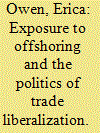| Srl | Item |
| 1 |
ID:
155490


|
|
|
|
|
| Summary/Abstract |
The movement of jobs overseas—known as “offshoring”—is one of the most politically charged aspects of globalization in developed countries. The high salience of offshoring reflects growth in competitive pressures from globalization that directly target individuals’ jobs. I argue that, in a world of fragmented production, how vulnerable one’s occupation is to offshoring helps explain patterns of protectionist sentiment not otherwise accounted for by existing work. I expect that the negative consequences of offshoring for workers will be particularly salient. As a result, vulnerability to offshoring is likely to generate protectionist sentiment toward free trade among constituents. Therefore, legislators whose constituents are vulnerable to offshoring should prove more likely to oppose trade liberalization. I measure vulnerability to offshoring at the district level using data from the US Census. I analyze roll call votes on free trade in the House of Representatives between 2001 and 2006. I find that the larger the share of their constituents who are vulnerable to offshoring, the more likely legislators are to vote against free trade and to discuss the costs of trade for workers in floor debates. My results suggest that the dynamics of offshoring constitute an overlooked dimension to the political economy of trade.
|
|
|
|
|
|
|
|
|
|
|
|
|
|
|
|
| 2 |
ID:
156709


|
|
|
|
|
| Summary/Abstract |
The recent backlash against globalization in many advanced economies raises questions about the source of this protectionist sentiment. Traditional accounts generally attribute the welfare consequences of trade to skill level or industry characteristics, or instead emphasize the nonmaterial determinants of support for openness. Consequently, we know little about how a major labor market characteristic—occupation—shapes both the distributional consequences of and preferences toward trade openness. We propose and test a new theory of trade policy preferences based on occupation characteristics. Drawing from the tasks literature in economics, we argue that occupation characteristics are a key determinant of how trade affects workers and thus individuals' trade preferences. Our theory suggests that, in advanced economies, individuals in routine-task-intensive occupations will be negatively affected by trade, and thus more protectionist. This relationship will increase in the degree to which occupation job tasks can be provided from a distance (i.e., offshorable). We find support for our theory using data from the 2003 and 2013 International Social Survey Programme in high-income democracies. Our results suggest that the occupational characteristics of routineness and offshorability are important determinants of trade preferences, offering additional understanding of the sources of protectionist sentiment even after controlling for labor market characteristics suggested by conventional wisdom.
|
|
|
|
|
|
|
|
|
|
|
|
|
|
|
|